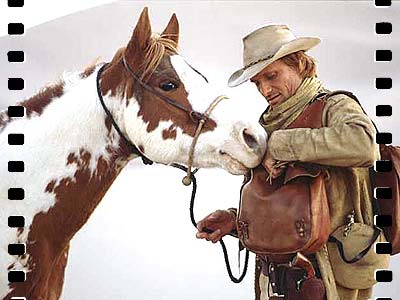 An expanded version of my Indian Comics Irregular essay Hidalgo the Horse Hoax:
An expanded version of my Indian Comics Irregular essay Hidalgo the Horse Hoax: An expanded version of my Indian Comics Irregular essay Hidalgo the Horse Hoax:
An expanded version of my Indian Comics Irregular essay Hidalgo the Horse Hoax:
Earlier this year, Disney released the family film Hidalgo. Hidalgo stars Viggo Mortensen (Lord of the Rings) as Frank Hopkins, a true-life figure who lived at the beginning of the 20th century. Critic Terry Lawson summarizes the movie's premise (Detroit Free Press, 3/5/04):
In "Hidalgo," Hopkins is a one-time cavalry messenger, Pony Express rider and buffalo hunter who is reduced to playing himself in Buffalo Bill Cody's Wild West shows and who is haunted by the slaughter at Wounded Knee, for which he assumes some responsibility as the rider who unwittingly delivered the cavalry attack order. Adding to his guilt is his secret: His mother is American Indian.
The combination of regret and trauma has led Hopkins to drink and despair, but he gets a shot at redemption when he is approached by horse-lover Rau Rasmussen (Victor Talmadge) and invited to compete in the Ocean of Fire, a 3,000-mile endurance race across the Arabian desert that is something of an advertisement for the superiority of purebred Arabian stallions.
One problem: Hidalgo is based entirely on Hopkins' claims. There's no evidence any of it really happened. As critic Bill Muller explains (Arizona Republic, 3/5/04):
The movie, ostensibly a true story, has well-documented credibility problems. A History Channel documentary paints Hopkins as a big fibber (as does an Outside Magazine article, "Liar, Liar, Chaps on Fire"). So far, researchers have failed to find any trace of an Ocean of Fire race, a record of Hopkins riding with Buffalo Bill or any of his other tall tales.
No biggie to base a movie on fiction, except that Disney is selling it as a true story. The film opens with the subtitle: "Based on the Life of Frank T. Hopkins," though the story apparently is drawn wholesale from Hopkins' memoirs, with a lot of "artistic" flourishes.
As the Billings Gazette reports (2/29/04), an academic debate has raged over Disney's fanciful tale:
[T]he film tells the story of Frank Hopkins, a half-Sioux cowboy who rides his tired mustang to victory in a 3,000-mile race across the Arabian Desert in 1890.
But critics of Hopkins say he made it all up while digging subway tunnels beneath Philadelphia.
"The man was a pathological liar," said Vine Deloria Jr., a noted Native historian and author of "Custer Died for Your Sins."
Among the movie's flaws:
Deloria said Hopkins' account of the Wounded Knee massacre appears to have been lifted largely from the Lakota holy man Black Elk's account of the event. He described Hopkins as one of the first of a long line of white men to pose as Natives.
[Screenwriter John] Fusco, who has built an otherwise solid reputation with Native people with work on movies like "Thunderheart," "Dreamkeeper" and "Spirit: Stallion of the Cimarron," described Deloria's criticism as especially painful.
And from the NY Times, 3/25/04:
Dennis Rice, a spokesman for Disney, sought to ease such concerns, saying: "We believe the movie is factually based on the life of Frank Hopkins. With that said, we've also stressed that this movie is not a documentary."
Kind of a mixed message, isn't it? According to Disney, the movie is "factually based" but not factual. That doesn't exactly ease my concerns.
The article continues:
Peter Harrigan, a British writer and journalist who has lived in Saudi Arabia for more than two decades, expressed profound skepticism. "The concoction of such characters was done in extraordinary disregard to the long thread of Western travelers who have left very thorough records of their time in Arabia," he said. "Peddling this movie as a true story is an example of the imperial nature of Hollywood's arrogance."
Mr. Fusco, speaking from his farm in Vermont, where he raises mustangs, said he was perplexed by the dust-up in Saudi Arabia. He views "Hidalgo," he said, as a story about a man who wins a personal victory—instead of one for his government—in a foreign land.
"A movie is just a movie," Mr. Fusco said.
Sure it is. Then why did Fusco work so diligently to make Dreamkeeper (ICI #106) faithful to the Native legends it portrayed? Why not just make up the legends if "a movie is just a movie"?
Any number of critics have punctured this hot-air balloon of an excuse. For instance:
Beginning with Wild West shows and continuing with contemporary movies, television, and literature, the image of Indigenous Peoples has radically shifted from any reference to living people to a field of urban fantasy in which wish fulfillment replaces reality.
Dr. Cornel Pewewardy (Comanche/Kiowa), Why Educators Can't Ignore Indian Mascots
Today, youth learn about Indians through distorted depictions in advertising, by watching television and movies, and through the symbols associated with athletic mascots.
Jonathan B. Hook, Ph.D., president, American Indian Resource Center
It is the repetitive regularity of the image in movies that refines and reinforces the societal stereotypes.
Rennard Strickland, Ph.D, Coyote Goes Hollywood, Native Peoples, 1/13/97
(For more testimony against Native stereotypes, see The Harm of Native Stereotyping: Facts and Evidence.)
So should Fusco and Disney not have made Hidalgo? Not at all. Juti Winchester, curator of the Buffalo Bill Museum in Cody, Wyoming, explains how they could have (and should have) done the movie. From the Billings Gazette:
It would start in the 1920s, with a tired, downtrodden Pennsylvania tunnel digger taking a break from his labor to lean on his shovel and dream of another life, a life filled with adventure.
"Now that would be a true story."
The full story on Hidalgo
Here are the sources for the critique above. From the Billings Gazette, 2/29/04:
Fact or fiction? 'Hidalgo' under fire
By KEVIN ABOUREZK
For The Gazette
These days, John Fusco is feeling a little like the main character of his screenplay, "Hidalgo"—chased, chastised and fighting to get to the finish line.
Fusco has been dogged by critics who charge that Disney's "Hidalgo," billed as based on a true story, is really based on a history of lies.
In theaters beginning March 5, the film tells the story of Frank Hopkins, a half-Sioux cowboy who rides his tired mustang to victory in a 3,000-mile race across the Arabian Desert in 1890.
But critics of Hopkins say he made it all up while digging subway tunnels beneath Philadelphia.
"The man was a pathological liar," said Vine Deloria Jr., a noted Native historian and author of "Custer Died for Your Sins."
Disney apparently changed the movie's marketing as of late. It now describes "Hidalgo" as "based on the life" of Hopkins, Fusco said.
The change was not made in response to Disney's critics, Fusco said. Instead, it reflects an "evolution" in the movie's production.
"It certainly has not had the kind of influence on the movie that some of these people believe it had," Fusco said.
Disney officials did not return repeated calls for comment.
At least one of the movie's critics, though, says the recent change is not enough.
"As far as I'm concerned, if they would've made it clear from the very beginning, we wouldn't be having this conversation," said Juti Winchester, curator of the Buffalo Bill Museum in Cody, Wyo.
'Hopkins hoax'
It all started about a year ago, when the Internet became abuzz with reports of what has become known as the "Hopkins hoax."
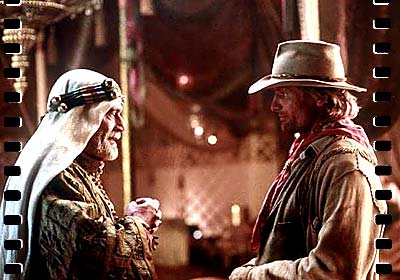
Fusco was on the movie's desert set when he got a phone call from a studio representative concerned about letters and e-mail Disney had received denouncing the Hopkins portrayal.
Besides claiming to have won more than 400 endurance races, Hopkins billed himself as an Army dispatch rider who witnessed the Wounded Knee massacre and starred in Buffalo Bill's Wild West Show.
In an effort to learn the truth about Hopkins, Cu Chullaine and Basha O'Reilly, founders of the Kentucky-based Long Riders' Guild, spearheaded an in-depth study of Hopkins' life.
Their work, including research conducted by more than 70 historians, was published in a recent book, "Hidalgo and Other Stories."
Deloria said Hopkins' account of the Wounded Knee massacre appears to have been lifted largely from the Lakota holy man Black Elk's account of the event. He described Hopkins as one of the first of a long line of white men to pose as Natives.
Fusco, who has built an otherwise solid reputation with Native people with work on movies like "Thunderheart," "Dreamkeeper" and "Spirit: Stallion of the Cimarron," described Deloria's criticism as especially painful.
The screenwriter even asked his friends in the Native community to talk to Deloria, to see why he was so critical of the movie.
"He basically told them, 'You can't control me. You can't tell me what to say,'" Fusco said.
Motives for attack
Fusco questions the Guild's research, saying much of it was based on material not even written by Hopkins and neglected to take into account Hopkins' extensive knowledge of horsemanship.
Hopkins gained the respect of 18 historians of his time, Fusco said, though his feats were mostly undocumented.
He sees other motives behind the attack on the film, as do other Hopkins devotees.
Tom Hebert, a horse program consultant for the Confederated Tribes of Oregon, sees the affront as the continuation of a decadeslong feud between Arabian horse and mustang enthusiasts.
The two groups have long fought over which breed has greater endurance. And Arabian horse proponents have long simmered over Hopkins' mythical win in the sands of the Arabian Desert, he said.
Hebert cited the Guild's bias toward the Arabian horse as a likely impetus for the controversy.
"It's something beyond Frank Hopkins," he said. "What is their agenda?"
Juti Winchester said she participated in the Hopkins study only because she wanted to learn whether Hopkins was, in fact, a star of the Wild West Show.
An exhaustive study of news reports and the show's payroll records turned up no evidence, she said.
For her part, Winchester envisions a less dramatic beginning for "Hidalgo" than the one soon to hit theaters.
It would start in the 1920s, with a tired, downtrodden Pennsylvania tunnel digger taking a break from his labor to lean on his shovel and dream of another life, a life filled with adventure.
"Now that would be a true story."
From the New York Times:
Saudis Question Accuracy of Disney Movie
By SIMON ROMERO
Published: March 25, 2004
RIYADH, Saudi Arabia—This country seems preoccupied more with the combustible engine than the Arabian horse, its highways buzzing with imported cars against a futuristic backdrop of skyscrapers, mosques and shopping centers.
Nevertheless, the Walt Disney Company's release in the United States this month of "Hidalgo," a film about a scrappy American cowboy who wins a 3,000-mile endurance horse race across the dunes of the Arabian peninsula, is being criticized here as a careless misinterpretation of Arab history and culture.
To start with, Saudi historians say such endurance races never took place and were geographically impossible. The producers of Hidalgo, which cost $80 million to make and was filmed in Morocco and California, say it is based on the life of Frank T. Hopkins, an American who claimed to have won a race called the Ocean of Fire in the 1890's.
"History and Disney don't seem to go together," said Mohammad Al Rasheed, a professor of literature and history and a Saudi political commentator whose family bred Arabian horses in the 19th century. "The race, had it happened, would have been recorded by Arab, British, French, Turkish and even Indian writers who were all over the Arabian peninsula in the 19th century. Why hasn't anyone written a thing or even mentioned it at all?"
Widening the gap between critics of "Hidalgo" and its producers, few Saudis have seen the film or will have a chance to see it until copies are made available on DVD or video. Public movie theaters in Saudi Arabia are prohibited under strict Islamic law that also bans music in public places and limits the mingling of men and women.
That has not prevented critiques of the film in Saudi newspapers, which obtained copies of the script by John Fusco, a screenwriter whose work also includes "Spirit: Stallion of the Cimarron" and "Thunderheart." Their concerns have been fueled in part by the film's popularity on American screens.

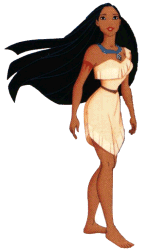
Dennis Rice, a spokesman for Disney, sought to ease such concerns, saying: "We believe the movie is factually based on the life of Frank Hopkins. With that said, we've also stressed that this movie is not a documentary."
In the United States, "Hidalgo" has made more than $48 million since its release, ranking No.6 last weekend at the box office. Disney has accompanied its release with a packet for teachers available on the Internet, enabling use of the film in schools as a teaching tool.
"A schoolchild could take a rule and draw a straight line from the start line in Aden across Arabia," The Arab News, an English-language Saudi newspaper, said in a recent article. "Three thousand miles would have the riders trotting through Istanbul to a finishing post somewhere in Romania. Even a circuitous canter around the coast of Arabia would put the finishing post north of Armenia."
The story of Hopkins's life is not short on controversy. Hopkins, who lived from 1865 to 1951, said, among other things, that he was the son of an Indian princess, and at age 12 was a long-distance cavalry rider—accounts later disputed by researchers. He was found to have led a largely urban life, working at one time as a subway-tunnel digger in Philadelphia.
His most amazing tale was of his victory in 1890 riding a mustang named Hidalgo in a race against dozens of Bedouins across a region of shifting sand dunes that later became part of Saudi Arabia. Arabian horse enthusiasts and endurance riding groups in the United States, whose members say they have ridden more than 1,000 miles on a single trip, have been among the fiercest critics of Hopkins and the film.
"This could have all been cleared up if they'd just consulted us," said Melissa Paul, curator of the W.K. Kellogg Library in Pomona, Calif., which has an extensive collection on Arabian horses. Ms. Paul, who said she had researched the existence of the Ocean of Fire and endurance-horse-racing Bedouins, said credible Western accounts of horse traditions in the Middle East never mentioned such an event.
She said that one authority, Maj. Gen. William Tweedie, a British official in Turkish Arabia in the 1890's, wrote a 411-page book on Arabian horses that never mentioned such a race. "Don't you think he would have heard of it since he was there the same time as Hopkins presumably was?" she asked.
The Disney spokesman, Mr. Rice, said research conducted by Mr. Fusco, the screenwriter, indicated that endurance horse races were similar to cockfights, in that few written records of their existence were available.
"Maybe Hopkins embellished the mileage," Mr. Fusco said in written responses to questions, adding that he based his belief in the Ocean of Fire race on accounts in magazines, horse journals and equestrian history books.
"I respect the right of those who don't believe that the race occurred," Mr. Fusco said. "It is not my right nor my business to tell someone how to think or feel about a movie."
In Saudi Arabia, the complaints about "Hidalgo" have centered largely on the film's portrayal of figures on the Arabian peninsula. A main character, for example, is a tribal leader played by Omar Sharif and called Sheikh Riyadh, apparently acknowledging not history but the name of the Saudi capital.
Another character in the film, a scheming British aristocrat named Lady Anne Davenport and played by Louise Lombard, is thought to be loosely related to Lady Blunt, a granddaughter of Lord Byron who traveled widely in the Middle East and wrote about her experiences collecting Arabian horses. Mr. Fusco said the Davenport character was entirely fictional.
Peter Harrigan, a British writer and journalist who has lived in Saudi Arabia for more than two decades, expressed profound skepticism. "The concoction of such characters was done in extraordinary disregard to the long thread of Western travelers who have left very thorough records of their time in Arabia," he said. "Peddling this movie as a true story is an example of the imperial nature of Hollywood's arrogance."
Mr. Fusco, speaking from his farm in Vermont, where he raises mustangs, said he was perplexed by the dust-up in Saudi Arabia. He views "Hidalgo," he said, as a story about a man who wins a personal victory—instead of one for his government—in a foreign land.
"A movie is just a movie," Mr. Fusco said.
Correspondent Gina Boltz summarizes the History Channel's findings:
Just in case you are interested in this story, last night the History Channel addressed the truth behind this movie and Mr. Hopkins. Those interviewed on the History Channel were genealogists, historians, a lady who works with Indian mustangs, and the screenwriter. The research was conducted across the world including the Middle East, the Buffalo Bill museum, city newspaper archives, and other places.
What was NOT found:
No record of Mr. Hopkins birth or residence at Ft. Laramie exists;
His name wasn't discovered in the U.S. Calvary records where he claims to have been the best of the best;
Mr. Hopkins claimed he was born in 1865, yet when he married in the 1900s, he listed his birth date as 1886 (or somewhere around that year). If true, he would have been only 3 years old when the race was run;
The Arabian race, which was supposedly 1,000 years old, was never run (rather, there is no written or oral knowledge of such a race);
No record exists of Mr. Hopkins ever working with Buffalo Bill's Wild West program;
A race he claims to have won between Galveston and Vermont is not documented in any newspapers or oral histories;
No facts could be found about Mr. Hopkins participating in any races at all;
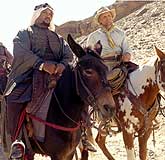
What was discovered about Mr. Hopkins is that:
He probably worked with the Ringling Barnum and Bailey Circus (behind the scenes). At the time he worked, the circus featured an act with real Arabian horses, Arabian horseman, and American horses and horsemen.
It may be his circus experiences that led to the vivid and believable details in his stories.
Mr. Hopkins later worked in the New York subway system.
He married a lady who, after Hopkins died, corresponded with someone who wanted proof and documentation behind Hopkins's stories. She had nothing to offer except excuses about how things were burned in a fire, lost, etc., etc. Her letters, which were found in a library, more discredited her husband than credited him.
By the time the program was over, a most convincing argument was presented that this race, and Mr. Hopkins's stories, are fabrications.
The reviews
The reviewers were almost as unkind as the historians. A sampling of their comments:
Posted on Fri, Mar. 05, 2004
'Hidalgo' stumbles but still wins
BY GEMMA TARLACH
Milwaukee Journal Sentinel
The truth is, if you plan on ponying up the bucks at the multiplex, you'll get an entertaining but far-short-of-epic popcorn romp that's equal parts "Indiana Jones" and "The Last Samurai," all of it anchored by the soft-spoken, slow-burn intelli-hunk Viggo Mortensen as Hopkins.
MOVIE REVIEW
Old-fashioned horse and hero
By Kenneth Turan, Times Staff Writer
Nothing in "Hidalgo," from its pounding hoofbeats to its racing pulses, is anything like a surprise; almost complete predictability is in fact part of this film's appeal. A little trimming, however, wouldn't have hurt: "Hidalgo's" overabundance of plot points and diversions lacks the substance to sustain its 2-hour, 16-minute length.
Hidalgo
Bill Muller
The Arizona Republic
Mar. 5, 2004 12:00 AM
For a movie named after a racehorse, Hidalgo is pretty poky.
Viggo Mortensen is fairly convincing as 1890s cowboy Frank T. Hopkins, who travels to Arabia for a long hoss race across the desert. Still, he can't save stilted and overly long Hidalgo, which feels like an old-fashioned Western, but not in a good way.
It's also a jumble of scenes from other movies. The big special-effects moments, a giant sandstorm and a swarm of locusts, owe much to The Mummy and associated spinoffs, while its computer-generated leopards would feel at home in Gladiator.
A Plot Written by a Mustang? He's Smart Enough Not to Say
By ELVIS MITCHELL
Published: March 5, 2004
The much too long, primitively plotted family action adventure "Hidalgo," directed by Joe Johnston, has a handful of well-handled sequences but, given the young audience the film is intended for, the picture may be like having to finish an entire pot of broccoli to get a couple of jelly beans for dessert. "Hidalgo" may yet be declared cruel and unusual punishment for kids of all ages.
.
.
.
Eventually the journey of Frank and Hidalgo becomes a testament to Frank's need for validation, and it is so full of incident that the movie is finally about as colorful and convincing as one of those penny dreadfuls about Buffalo Bill's own life. There aren't many films that include the Wounded Knee massacre, a shot of the Statue of Liberty, a computer-generated sandstorm left over from "The Scorpion King," megasize locusts and a grand and incredibly staged rescue from a kidnapping, which logistically and storywise is the film's high point.
'Hidalgo' a test in endurance
March 5, 2004
BY TERRY LAWSON
FREE PRESS FILM CRITIC
Equine enthusiasts and Western scholars have already taken umbrage with "Hidalgo," saying it doesn't just take the usual liberties, it fabricates its story out of whole cloth. The fact that many historians consider even Hopkins' account to be self-glorifying bunk might be worth delving into if "Hidalgo" was worth the time and effort.
It's not. "Hidalgo" is far less dramatic than Hopkins' exaggerated or imaginary exploits, and its misguided effort to turn a tale of an American maverick into a parable of tolerance and cultural understanding makes a Sunday school lesson out of what could have been an exciting story.
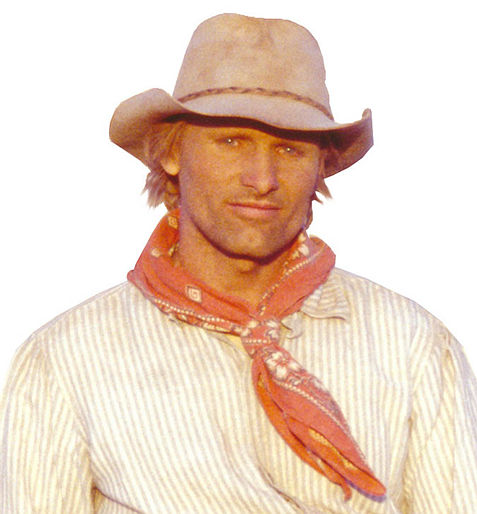
Rob's comment
Having Viggo Mortensen play Frank Hopkins is ridiculous. He's about the last person who looks Native. (I guess Paul Newman and Robert Redford were unavailable?)
As Bill Muller kindly put it, Mortensen is "a bit too Nordic (his dad was from Denmark) to pass as half-Indian." This race-free casting harkens back to the days of Greeks, Italians, and Jews playing Indians.
Portraying Hopkins as a "half-breed" and a drunk is stereotypical, of course.
Hopkins the horse hero?
John Fusco contacted me in Dec. 2004 saying I was misinformed about the authenticity of Hidalgo. He eventually posted his views on the controversy at Frank Hopkins—2006 Update.
In a message to me, he said he put the same care and research into Hidalgo as he did his other Native projects. Native elders and local ranchers provided oral histories about Hopkins and helped make the movie as accurate as possible. But when they were approaching the end of filming, he was attacked by researchers who claimed he was perpetrating a Hollywood hoax.
These researchers, the O'Reillys mentioned above, claimed they had found a manuscript that contained all of Hopkins's tall tales. But when Fusco examined the manuscript, he found it was written by Hopkins's widow after his death. She was old and embittered when she wrote it and apparently made up the stories to cash in on Hopkins's reputation.
The O'Reillys publicized their bogus findings in an attempt to discredit Hidalgo. They riled up the press, the Arabs, the History Channel, and the scholars who denounced the film, including Vine Deloria Jr. Fusco urged them to look at his evidence, but they declined to act.
Why would the O'Reillys make false charges? Apparently the husband, in particular, was a devout Muslim with chauvinistic feelings toward his fellow Muslims and their horses. He was angry that a movie would show an American riding a mustang to victory over Arabian horses in the Middle East.
Since Fusco labeled his message a "personal letter—not for publication," I haven't quoted him. But the following were my responses to Fusco, which were not personal letters and thus were for publication. <g>
Rob's replies (12/06/04)
John,
Interesting!
I'll have to check the websites you mentioned when my DSL service comes back up. It's not working at the moment. If I can't publish your letter (or any part of it), it would be nice to present your side of the story. I don't want to leave my readers with the wrong impression.
I'm not as concerned about Hopkins's horsemanship or the veracity of the long-distance race as I am about his Lakota origins. I'm not sure what the evidence for that is. Oral traditions? Those aren't necessarily reliable—especially if Hopkins exaggerated or made up his history and others believed him.
Is there anything other than oral traditions to back up Hopkins's claims that he was "an Army dispatch rider who witnessed the Wounded Knee massacre and starred in Buffalo Bill's Wild West Show"? The curator of the Buffalo Bill Museum seemed to say no. Shouldn't there be some record of a person who "starred" in the shows?
Also, didn't Saudi officials weigh in on the question of whether the long-distance race ever occurred? I don't think the naysayers were just one couple or guild with an axe to grind. If the host country denied the existence of the race, that would seem to be significant.
If I'm really curious, I guess I should look at the "Hidalgo and Other Stories" book too. Whatever the truth is, it won't faze me, since I don't have any horse-related agenda. All I care about is reporting the story accurately.
Rob
John,
Thanks for the additional information. If this isn't publicly available somewhere, it should be. I always like to see all sides of an issue.
If I were you, I'd take all this information and try to publish it as a magazine article. I'm still not sure why you want to keep it private.
The Arizona Republic article I quoted said: "So far, researchers have failed to find any trace of an Ocean of Fire race, a record of Hopkins riding with Buffalo Bill or any of his other tall tales." That's still a true statement, isn't it? There are oral traditions but no records or other tangible traces of these events?
One of my correspondents summarized the History Channel documentary for me, since I didn't see it. Are there any errors in her summary? She claimed the documentary found an amazing lack of evidence regarding Hopkins's background and at least one lie.
I understand that there were few reasons to associate oneself with Native people back then and many reasons to avoid it. But if Hopkins wanted to preserve the mustangs, that would've given him a reason. "I'm half-Native, so you can trust my knowledge of these horses"...that sort of thing.
My impression of the news reports is that the O'Reillys gained credibility by enlisting 70 historians (on their book) as well as Vine Deloria (if they didn't enlist him, he seems to have taken their side). In a debate over who's telling the truth, it's hard to believe one couple with an agenda could hoodwink Deloria and a plethora of historians. But you do make an excellent case for your position, which is why I want to see it posted somewhere.
I still like the dramatic framework Winchester suggested: having Hopkins as an old tunnel digger narrating tales from his youth. That might've avoided some of the questions about whether the stories and traditions were true.
Incidentally, Thunderheart is at the top (tied) in my poll too. See The Best Indian Movies for the list. And I was there for the First Americans in the Arts awards last year, since I live in LA.
Rob
Another exchange (1/6/05)
John,
I'm online again with my new cable service and finally getting back to Hidalgo.
Did you write and publish your article correcting the record on Hidalgo? I don't see it on www.frankhopkins.com. In fact, I don't see anything by you there except the Pyle interview. Nothing that talks about the evidence of his Indian background, which is what most concerns me.
I don't see anything about Gertrude Hopkins at www.frankhopkins.com/articles27.html, either. About all the Pyles say is that they recognized Hopkins in the photograph. So the claim that he never sat on a horse is probably false...but I still don't know how much of his Indian background is true or false.
The home page does say:
J. Frank Dobie, who introduced many to Frank T. Hopkins in his 1934 book, The Mustangs, quotes Aristotle in his introduction, "The artistic representation of history is a more serious pursuit than the exact writing of history, for the art of letters goes to the heart of things."
This site is not an historical treatise. It is a tribute to the legend and lore of Frank Hopkins, and a celebration of the horses that he rode then, and we ride today.
which isn't exactly a testament to historical accuracy. There seems to be some validity to the critics' charge that "Hidalgo" went well beyond the known historical record. That may be fine in a movie "based on" the true story, but not a movie that purports to be the true story.
Rob
>> In response to your final sentence below, Hidalgo WAS "Based On," and never purported to BE the true story. It clearly states up front in the film "Based on..." <<
Yes, but "based on the life," not "based on the legend." As the New York Times wrote:
Dennis Rice, a spokesman for Disney, sought to ease such concerns, saying: "We believe the movie is factually based on the life of Frank Hopkins."
With language like that, the movie shouldn't stray far from the facts. If it does, critics have every right to point out its flaws or stereotypes.
Rob
Final thoughts
Fusco didn't reply further, implying he was too busy to spend more time defending Hidalgo. So I'm left to sum up the controversy myself.
That I quoted articles that turn out to be full of half-truths and mistakes isn't a huge problem. I was just reporting on the controversy, which did indeed bloom. But I was probably wrong to write:
One problem: Hidalgo is based entirely on Hopkins' claims. There's no evidence any of it really happened.
even if it was a paraphrase of what I'd read. Based on oral and written records, it appears that Hopkins was a horseman who participated in races and other escapades in the West, not an urban dweller with an active imagination. A photo of Hopkins on a horse disproves the claim that he didn't know a horse's head from, well, the other end.
I wrote my analysis of Hidalgo—everything up to receiving Fusco's message—before I'd seen the movie. Now I've seen it, so I can comment a bit more on its Native themes.
In Hidalgo, the following things occur:
So...as far as I can tell from my correspondence with Fusco, the idea that Hopkins's mother was an Indian was just a rumor. There's no evidence he was present at Wounded Knee or rode in Buffalo Bill's Wild West Show. There's no evidence the Ocean of Fire race happened, despite its alleged existence for 1,000 years. (A 1,000-year-old event that no one has ever documented must be a world record.)
There's no law against embellishing history for a work of fiction, but huge chunks of Hidalgo—Hopkins's Lakota background and the Ocean of Fire race—appear to be made up. Thus I still question the accuracy of the "Based on the life of" tag, which was the original source of the controversy. If you made a movie about George Washington in which the central conceit was his chopping down a cherry tree, I wouldn't say that was based on the life of Washington. I'd say it was based on the legend of Washington, or it wasn't based on anything.
Addendum (2008)
When I was loading the Pirates of the Caribbean DVD, I came across a trailer for Hidalgo. The on-screen legend said the standard "Based on a True Story." But the trailer's narrator didn't qualify the movie's origin. He called Hidalgo an "incredible true story," period.
I'd say Disney is trying to have it both ways. It's promoting the movie as a true story to increase its sales and viewership. But if anyone doubts the company's claims, it can point to the "Based on" tagline. Hidalgo a true story if you buy it and like it; it isn't if you question or criticize it.
Therefore, critics like me were right to challenge Disney on this point. And John Fusco et al. were wrong to claim Disney made the movie's provenance clear. It's about as clear a hoofprint in a sandstorm.
Related links
The best Indian movies
|
. . . |

|
All material © copyright its original owners, except where noted.
Original text and pictures © copyright 2007 by Robert Schmidt.
Copyrighted material is posted under the Fair Use provision of the Copyright Act,
which allows copying for nonprofit educational uses including criticism and commentary.
Comments sent to the publisher become the property of Blue Corn Comics
and may be used in other postings without permission.